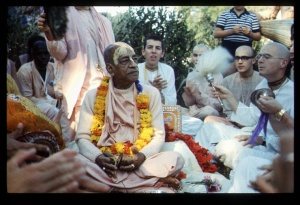SB 4.28.3

A.C. Bhaktivedanta Swami Prabhupada
TEXT 3
- kāla-kanyāpi bubhuje
- purañjana-puraṁ balāt
- yayābhibhūtaḥ puruṣaḥ
- sadyo niḥsāratām iyāt
SYNONYMS
kāla-kanyā — the daughter of Kāla; api — also; bubhuje — took possession of; purañjana-puram — the city of Purañjana; balāt — by force; yayā — by whom; abhibhūtaḥ — being overwhelmed; puruṣaḥ — a person; sadyaḥ — immediately; niḥsāratām — uselessness; iyāt — gets.
TRANSLATION
Gradually Kālakanyā, with the help of dangerous soldiers, attacked all the inhabitants of Purañjana's city and thus rendered them useless for all purposes.
PURPORT
At the fag end of life, when the invalidity of old age attacks a man, his body becomes useless for all purposes. Therefore Vedic training dictates that when a man is in his boyhood he should be trained in the process of brahmacarya; that is, he should be completely engaged in the service of the Lord and should not in any way associate with women. When the boy becomes a young man, he marries between the ages of twenty and twenty-five. When he is married at the right age, he can immediately beget strong, healthy sons. Now female descendants are increasing because young men are very weak sexually. A male child will be born if the husband is sexually stronger than the wife, but if the female is stronger, a female child will be born. Thus it is essential to practice the system of brahmacarya if one wishes to beget a male child when one is married. When one reaches the age of fifty, he should give up family life. At that time one's child should be grown up so that the father can leave the family responsibilities to him. The husband and wife may then go abroad to live a retired life and travel to different places of pilgrimage. When both the husband and wife lose their attachment for family and home, the wife returns home to live under the care of her grown-up children and to remain aloof from family affairs. The husband then takes sannyāsa to render some service to the Supreme Personality of Godhead.
This is the perfect system of civilization. The human form of life is especially meant for God realization. If one is unable to take to the process of Kṛṣṇa consciousness from the very beginning of life, he must be trained to accept these principles at the fag end of life. Unfortunately, there is no training even in childhood, nor can one give up his family life even at the end. This is the situation with the city of Purañjana, figuratively described in these verses.